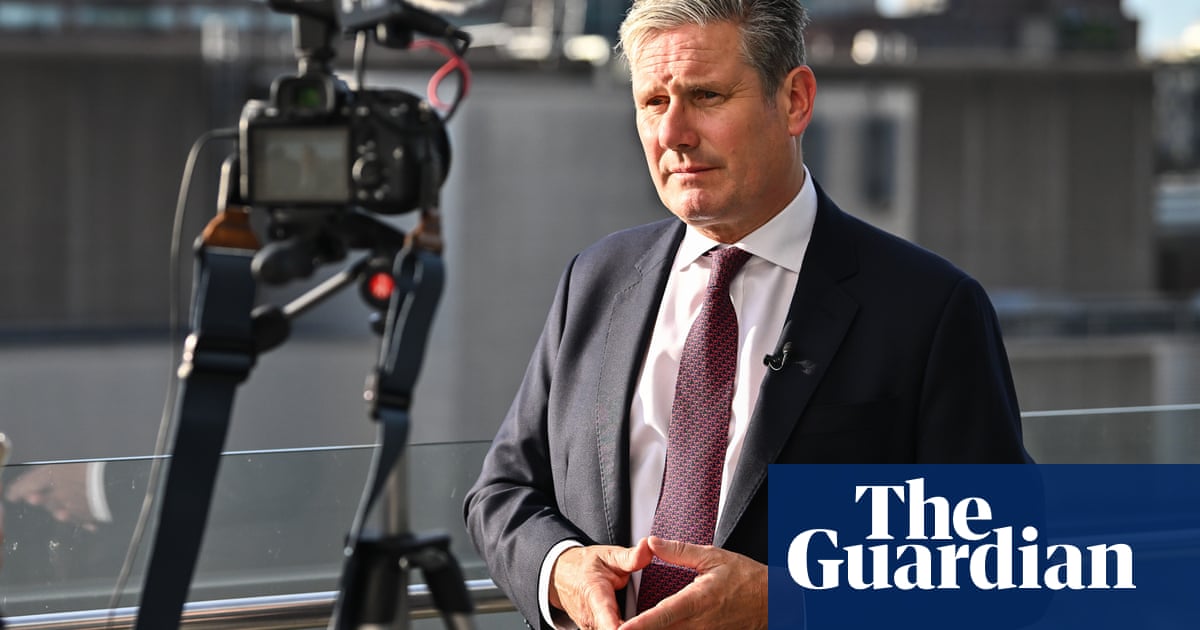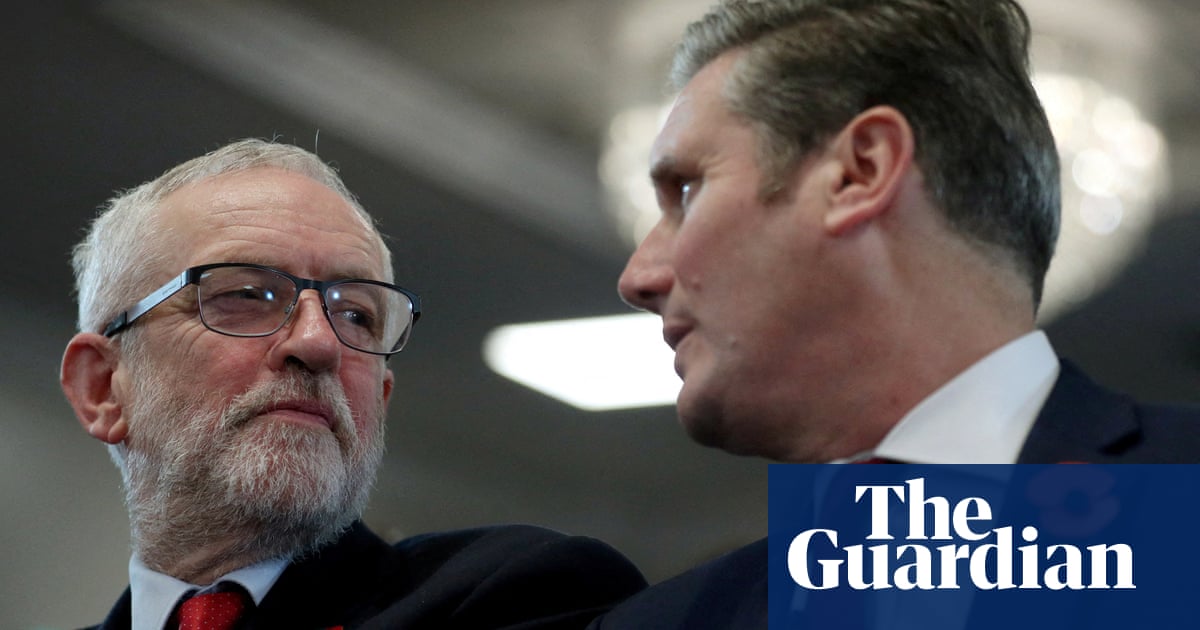
Labour will make a clean break from its divisions over Europe and will not seek major changes to the UK’s relationship with the EU, Keir Starmer has told the Guardian, vowing to shift Labour’s focus to “Britain in the 2030s” rather than the battles of 2016.
Evoking Tony Blair’s election slogan of “forward not back” on the eve of the vote on the post-Brexit trade deal, Starmer said he wanted to lead a party that was focused on the future – saying it was unlikely Europe would even feature on his party’s election leaflets.
The Labour leader, who said the aim of his first year had been listening to voters about the party’s general election loss, said his party would now begin to spell out its vision of a future Labour government. Starmer said 2021 would be the time to define his vision and values as a future prime minister – with a focus on the economy and the NHS.
In a nod to his angry backbenchers, dozens of whom are expected to refuse to endorse the Conservative deal, Starmer said he knew there were difficult choices, but said the vote for the deal would bring some closure.
Johnson has often sought to characterise Starmer as a “remainer lawyer” and one of the most outspoken advocates for a second referendum under Jeremy Corbyn’s leadership. But Starmer said he would now define his own image.
“I’m determined the next general election will be fought on our terms, not somebody else’s terms,” he said. “We’ve left the EU and the remain/leave argument is over. Amongst the reasons for voting for the deal is to allow that closure. In our general election campaign in 2024, we will be a future-looking Labour party and a future Labour government, not one that looks behind us.”
In his interview, Starmer also warned about the crisis facing the NHS and schools over the next month, saying the UK was “staring down the barrel” of a third lockdown in January.
Labour will attempt to amend the bill which will enforce the trade deal from 11pm on 31 December – including additional protections on labour and environmental standards and support for business preparedness but none are likely to succeed. Johnson’s deal is likely to pass with ease with Labour’s support – though the Liberal Democrats, the SNP and the DUP have said they will vote against the deal.
Starmer suggested he had been convinced of the need to vote for the deal for some time – and defended his decision to announce Labour’s position shortly after the deal had been published.
“I have been up to my ears in the details of the Brexit negotiations,” he said. “I’ve read everything available on all the negotiating positions and the details of them. We had a very, very good idea of what this deal was going to look like – borne of four years of studying every twist and turn of this along the way.”
The Labour leader has faced some criticism from his backbenchers for his framing of the vote as a choice between deal and no deal – when many would favour abstaining and thus withholding any implied endorsement.
“If you vote against it, you are voting for no deal. That’s the SNP’s inexplicable position. The consequence of that, if they succeed, will be no deal.”
Starmer said accepting the deal that was on offer meant accepting that it would be the relationship in place if Labour entered government in 2024. “This is a tough choice, I absolutely understand that.”
“We vote tomorrow in the mindset of the next general election in 2024. If we come into government in 2024 – and I hope we do – we will inherit this deal. The public in Britain would expect us to make this deal work.”
Starmer said he could not envisage Europe or Brexit playing any part in the election campaign of 2024 – or featuring on any Labour MPs’ election leaflets – despite the opportunity for a review of the treaty in 2024, which is spelled out in the current deal.
“It’s pretty unlikely. The focus will be on Britain and on Britain’s role in the world,” he said. “Will the renegotiation of the treaty be central to the manifesto? No.
“If we are still arguing in 2024 abut what has gone in these past four years, we’re facing the wrong way as far as I’m concerned.”
Starmer said there was a case Labour would make over the coming months and years about ways to improve the UK’s relationship with the EU, including access to security data and the ability of artists and musicians to operate across Europe. “But there will not be an appetite for renegotiating the entire treaty.”
Starmer plans to make 2021 a more proactive year for Labour’s policy offering but was cautious about making any concrete promises about what will be in the party’s next manifesto.
“We are still four years from a general election,” he said. “But my priority going into next year and central to our arguments going into 2024 will be the economy.”
He is reluctant to specify what exactly that offering would be, but said the primary focus would be jobs and “how we support good businesses and good jobs … I don’t just mean pay, I mean dignity in jobs – and how we support the economy across the different regions and nations.”
Starmer is likely to find Boris Johnson attempting to fight on Labour’s terms with his “levelling up” agenda where new Tories in the red wall are able to point to infrastructure and high street investment in their seats. But Starmer said he believed the drive would be cosmetic. “Levelling up is going to turn out to be a version of David Cameron’s big society, which is words that don’t mean anything or achieve anything,” he said.
“There was no levelling up when the government was fighting Andy Burnham in the north-west. If the prime minister thinks that building the odd thing in places across Britain and sticking a Tory MP’s photo on it is levelling up then he is misdescribing anything he is likely to achieve.”
Starmer’s second – and most obvious – focus will be the fallout from the pandemic and its effect on the NHS. “We are the country with the highest death toll from Covid in Europe, and also the likely deepest recession of any major economy,” he said.
“We’ve been only a matter of weeks out of that second lockdown and we’re effectively staring down the barrel of the third lockdown. Everybody understands that the government will make mistakes in trying to handle a pandemic, but a government that just repeats the mistakes really is incompetent.”
Starmer said he knew he would need to continue to navigate his biggest challenge as an opposition leader – “supporting the government where it’s necessary to do so and criticising and challenging where it is necessary to do so.”
Once the constraints of the pandemic begin to ease, Starmer said he hoped to spend much of 2021 on the road. “We’re very determined that I’m going to be out at least twice a week in different places across the UK, mainly going to places that we’ve got to win votes in a places where we lost,” he said. “The sooner we can do that, the better. It’s really frustrating that we’ve not been able to do it in the way we wanted.”












